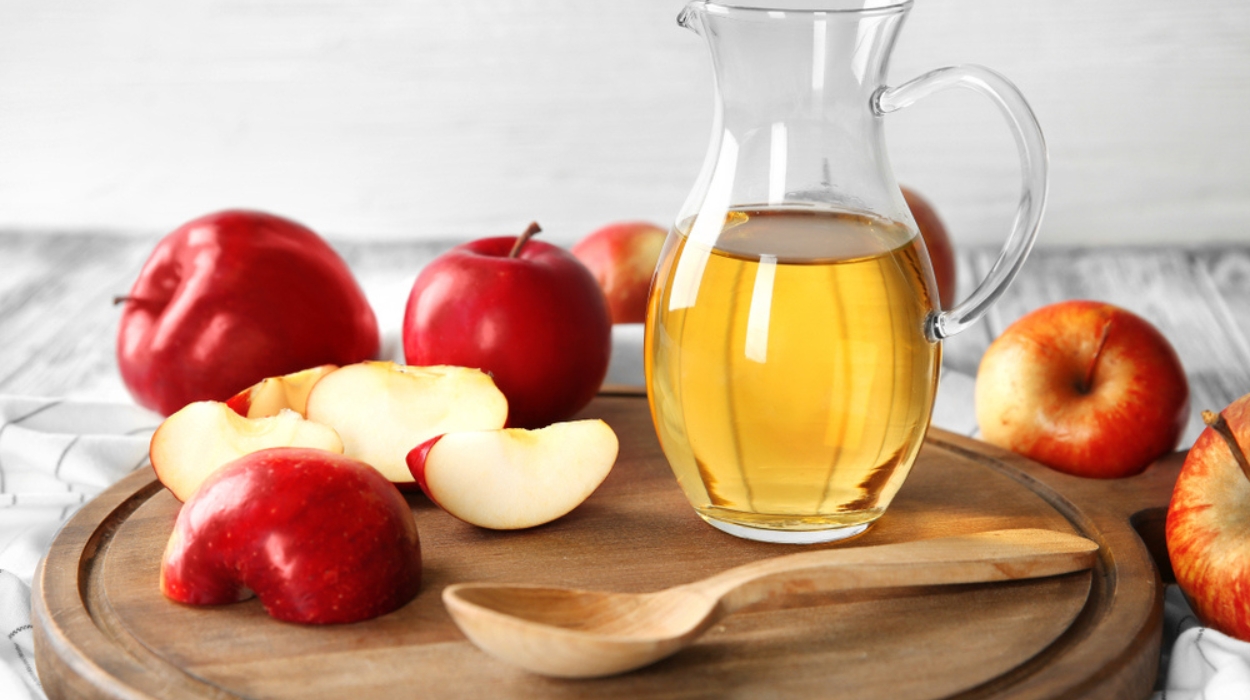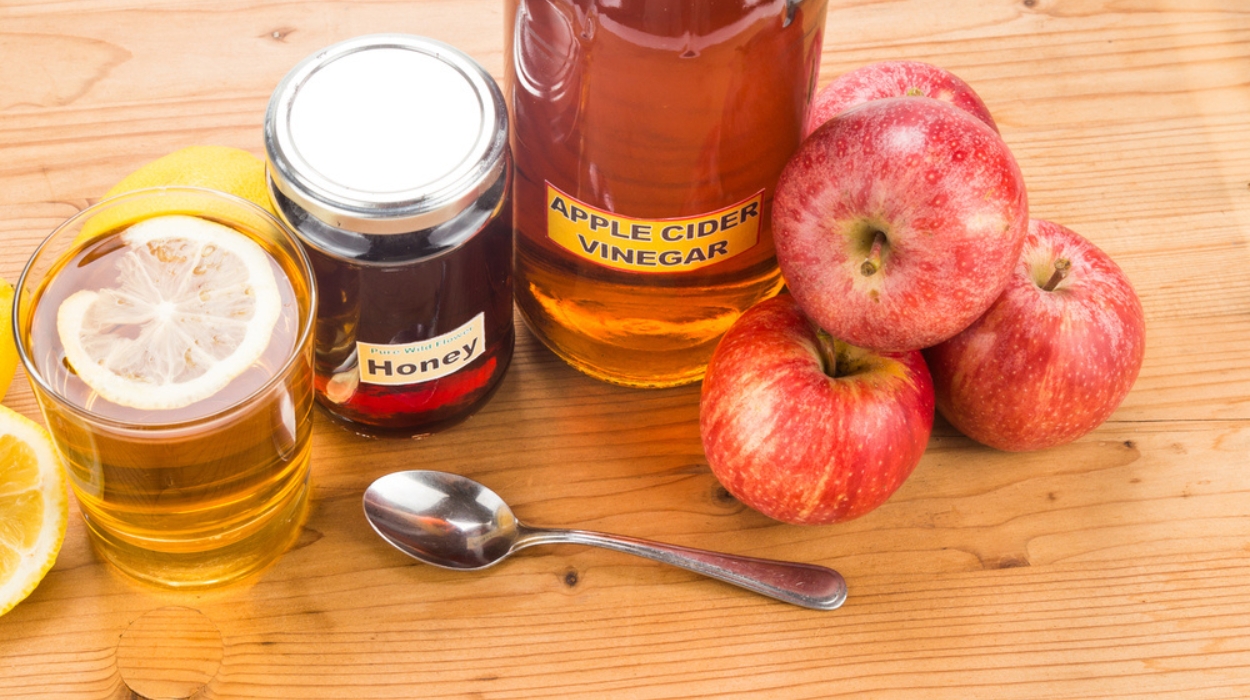Honey, with its vitamins and antioxidants, is used to treat ailments such as cold symptoms and bacterial imbalances. Vinegar’s acidic properties have made it useful in increasing stomach acid, improving digestion, and balancing blood sugar. Together, the benefits of apple cider vinegar and honey combination offer even more in the way of improved immunity, less risk of heart disease,[1] and better skin. Let’s explore each ingredient individually, then dive into some more ways this tonic can boost health and well-being.
Apple Cider Vinegar And Honey Benefits
- Helps with weight loss.
- Alleviates cold and allergy symptoms.
- Improves heart health.
- Helps with acid reflux.
- Improves skin conditions.
- Soothes sore throat.
- Combats coughs.
Apple Cider Vinegar With Honey Benefits
Helps With Weight Loss
Apple cider vinegar has been shown in some studies to help promote weight loss. One way it does this is by slowing down the absorption of sugar in the body, steading blood sugar. When this happens, rather than hunger coming on fast and strong, satiety is achieved for longer periods of time. There’s some evidence to suggest that ACV may also help to reduce body fat – in clinical trials, those who took ACV lost more weight than those who didn’t. For the purposes of weight loss, adding honey to ACV should be done in small amounts, as honey contains excess sugar and calories.
Alleviates Cold and Allergy Symptoms
Both ACV and honey on their own are great for cold and allergy symptoms due to their antimicrobial (or antibacterial) properties. The small amounts of pollen in honey are used to alleviate seasonal allergy symptoms, such as runny rose, itchy eyes, hay fever, and sneezing. Apple cider vinegar contains small amounts of probiotics from the fermentation it undergoes, and these probiotics help to encourage more beneficial bacteria in our gut microbiome, which among other things, is responsible for our immunity.
Improves Heart Health
Apple cider vinegar tonics may help heart health in three ways. Firstly, the chlorogenic acid in the vinegar may help to reduce unhealthy LDL cholesterol. Secondly, honey has positive effects on blood pressure,[2] reducing it to a healthy level. Honey also contains antioxidants[2] which can reduce blood clotting by improving blood flow and circulation. Thirdly, ACV can reduce inflammation, which can clear up plaque in the arteries. Together, these factors reduce the risk of heart attack and stroke.
Helps With Acid Reflux
Honey’s soothing effect can do wonders for acid reflux. Additionally, ACV is used as a home remedy for acid reflux and heartburn. It works almost counterintuitively. In many cases of acid reflux, the cause is not too much stomach acid, but rather, not enough. For this reason, helping to build up adequate stomach acid is part of the treatment to heal from reflux. One way to do this is to ingest sour and/or bitter foods a few minutes before each meal, which helps to stimulate stomach acid production, and in turn, reduce reflux and improve digestion.
It’s essential that when consuming ACV it is diluted in water. This is especially true when using it for acid reflux, as the acidity of the vinegar can damage or irritate the throat, stomach, and esophagus. Be sure to rule out ulcers before drinking honey and ACV for heartburn.
Improves Skin Conditions
Many skin conditions are driven by inflammation, poor gut health, and bacterial overgrowth. These can be tamed with anti-inflammatory foods such as ACV and honey, but can also be treated topically using the same foods. You can create a moisturizing and antibacterial face mask by mixing ACV (1 teaspoon) and honey (1 tablespoon). Apply it to the face for 20 minutes then rinse with warm water. The honey helps to bring more moisture to the skin while killing bacteria, and ACV helps to remove dead skin cells and balance the skin’s natural pH.
Soothe Sore Throat
A classic home remedy for a sore throat is to drink apple cider vinegar with honey in warm water. One spoonful of honey and one of ACV in a full glass of water should do the trick – always make sure vinegar is diluted. Similar to gargling with salt water, the properties in both ACV and honey combat bacteria in the mouth, which helps to ease the pain of a sore throat. Honey can also be taken on its own to add a sticky coating that eases soreness and irritation and reduces inflammation.
Combat Coughs
Similarly to how ACV and honey help with a sore throat, it can also help to reduce coughing. Just mix equal parts vinegar and honey (1-2 tablespoons of each) in a full glass of warm or hot water. You may also wish to add a little ginger, cayenne pepper, cinnamon, and/or lemon to boost the effects and taste. Sip this tonic throughout the day or in one sitting.
Is Apple Cider Vinegar Good For You?

Apple cider vinegar (ACV) is fermented apple juice. The juice is fermented twice and contains yeast. The distinctive sour taste comes from its main ingredient, acetic acid. ACV is most often used in salad dressings or in other condiments, though many dilute a little ACV in water and drink it on its own as a home remedy for heartburn and colds, among other things. ACV is generally safe and healthy to consume in small amounts and can be drunk as well as taken in pill and gummy form.
Not all ACV is created equal; many grocery store versions are distilled and filtered, making them clear (and perhaps more visually appealing). However, the raw, unfiltered version, which has a cloudier appearance with brown pieces floating in it (known as “the mother”) is said to be healthier. “The mother” contains beneficial yeast and bacteria which can aid in better gut and overall health.
Is Honey Cider Vinegar Good For You?
Adding apple cider vinegar to honey has many potential health benefits. But before we get into them, let’s look at honey, specifically. Though healthy, raw honey should be consumed in moderation and in responsible ways.
For example, raw honey has antioxidants and polyphenols,[2] both of which can fight aging and oxidative stress caused by free radicals, which if left unchecked, can lead to disease. Additionally, honey can have immediate benefits for wound healing and sore throats. That being said, honey is also pure sugar – fructose specifically, which when consumed on its own (especially in large amounts) can cause blood sugar spikes and can be taxing on the liver. And though honey has some vitamins and minerals, the amount is not overwhelming when compared with certain fruits which have less sugar.
For this reason, eating honey on its own is not ideal, however, combining honey with ACV can help to curb the sugar’s impact so that the body can reap the benefits of the vitamins and antioxidants more easily.
How To Consume Apple Cider Vinegar And Honey?

The simplest way to drink honey and honey is to mix them together with water and then drink it as a shot. You can expand on this by using more water and adding lemon, ginger, and cinnamon to create a healing tonic.
You may also mix ACV and honey with olive oil and spices to make a salad dressing. This tastes exceptionally good on leafy greens such as arugula and spinach.
Keep in mind that it’s not recommended to have more than a few tablespoons of ACV and/or honey in one day, so be sure to space out the dosages if you’re consuming it every day, and no more than one tablespoon at a time. Honey can deliver too much sugar if consumed too much, too often, and ACV can erode tooth enamel, burn the throat and esophagus, and induce nausea if it is not diluted enough in the water.
It’s always best to start off low and slow – small amounts for a few days, see how you feel, then you can always increase based on tolerance.
Conclusion
Both apple cider vinegar and honey individually have many wonderful healing properties. Together, they form a powerful and delicious tonic that can be used in a variety of ways. From lowering blood pressure, stabilizing blood sugar,[1] aiding in weight loss,[1] improving digestion, and clearing up cold and allergy symptoms, there are many benefits to be had from incorporating ACV and honey into your diet. Moderation is key for both ACV and honey, as each can work against health if taken too much and incorrectly – always be sure to have small amounts, diluted in water, and when in doubt, consult your healthcare provider.
Frequently Asked Questions
It should not make a significant difference to health outcomes whether you get processed or raw versions of these foods, however, when possible, it’s generally best to get organic, raw, unfiltered ACV and raw or manuka honey.
Honey is pure sugar, so while it has health benefits, it should be consumed in moderation (no more than one spoonful a day). ACV should also be limited to 1-2 spoonfuls a day unless otherwise directed by your doctor.
As always, if you have a suspected or confirmed allergy to either of these foods, you should avoid them. Those with ulcers should avoid apple cider vinegar. Those with certain medical conditions, such as kidney disease, may also need to avoid these foods (always consult your doctor). Also, vegans may wish to avoid honey because it is produced by bees.
 Expert's opinion
Expert's opinion
